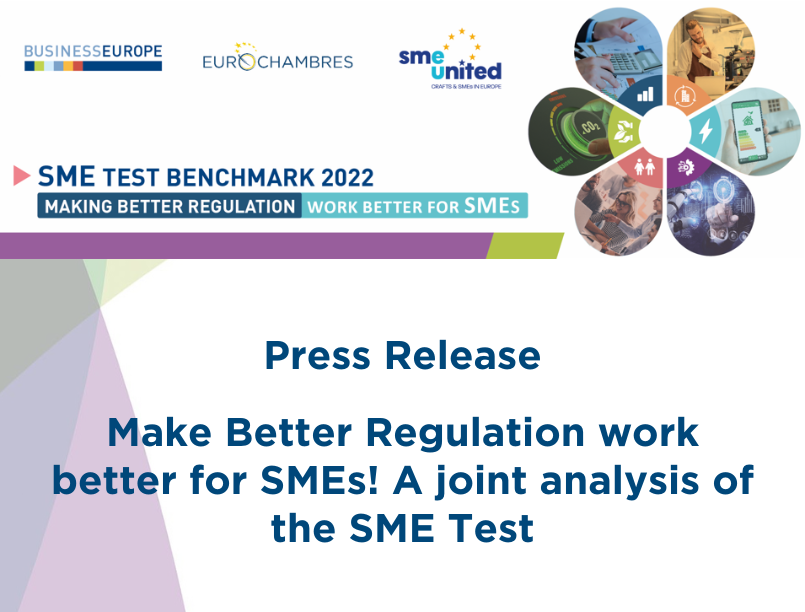A joint analysis of the SME test
(Prague, 29 November 2022)
BusinessEurope, Eurochambres, and SMEunited have joined forces to analyse the application of the SME Test across the European Commission services. 26 impact assessments have been checked against the European Commission’s own better regulation guidelines to assess whether and to what extent the SME Test, a mandatory tool in ensuring an SME-proofed regulatory regime, is carried out.
The conclusions of our work provide a mixed picture. While better regulation principles have steadily grown in importance in the working procedures of the EU over the past two decades, the SME Test guidelines are still not applied consistently by all Commission services.
BusinessEurope Director General Markus J. Beyrer said:
“The impacts and costs created by Commission proposals on SMEs are too often neglected. This needs to be improved by consistently devising mitigating measures based on solid and reliable data. Not only direct but also indirect costs should be identified and reduced if not eliminated”.
Eurochambres Chief Executive Officer Ben Butters added that:
“With business confidence across Europe at historically low levels, it is more important than ever that EU legislative initiatives respect the “think small first” principle and contribute to an SME-friendly policy environment”.
SMEunited Secretary General Véronique Willems concluded that:
“This is every DG’s responsibility to carry out a meaningful SME Test. Only a thorough analysis at every step will guarantee proportionate rules enabling entrepreneurs to flourish”.
SME Test Benchmark main findings:
69% of the proposals’ inception impact assessments (IAs) take into consideration whether SMEs are affected.
Among the 26 initiatives under analysis, 24 respect the 12-week period for the open public consultation. However, in 16 cases the period overlapped with holidays.
10 out of 26 consultations of the IA report include one or more sections presenting SMEs’ views. This is a disappointing result, as in most cases SMEs were directly or indirectly impacted by the initiatives.
IAs do not pay sufficient attention to indirect impact on SMEs when considering mitigating measures.
Based on our analysis, we propose the following recommendations to ensure that the Better Regulation approach leads indeed to a better regulatory framework for SMEs:
In line with the “think small first” principle, the Commission services must reflect on SME needs early in the IA process. This could be done systematically, foreseeing a more inclusive involvement of SME stakeholders.
IAs should dedicate chapters to a thorough assessment of the impact on SMEs to consolidate this information in a clear and transparent manner.
IAs should differentiate between different size-classes of SMEs (micro, small, and medium) to allow for a more granular and targeted assessment of each initiative’s impact.
IAs must assess the indirect effect of policies, thus going further than assessing the sole direct effect of a policy. To quote the Regulatory Scrutiny Board, proposals must “explore the unintended consequences (…) on SMEs.”
The SME Test, building on the rationale of the “think small first” principle to which the European Commission rightly subscribes, plays a very important role. While businesses face increasing economic challenges and uncertainty, it is important to follow a fit-for-purpose and proportional law-making approach.
The SME Test Benchmark “Making better regulation work better for SMEs” was presented during the 2022 EU SME Assembly in Prague.
The full report is available here.






